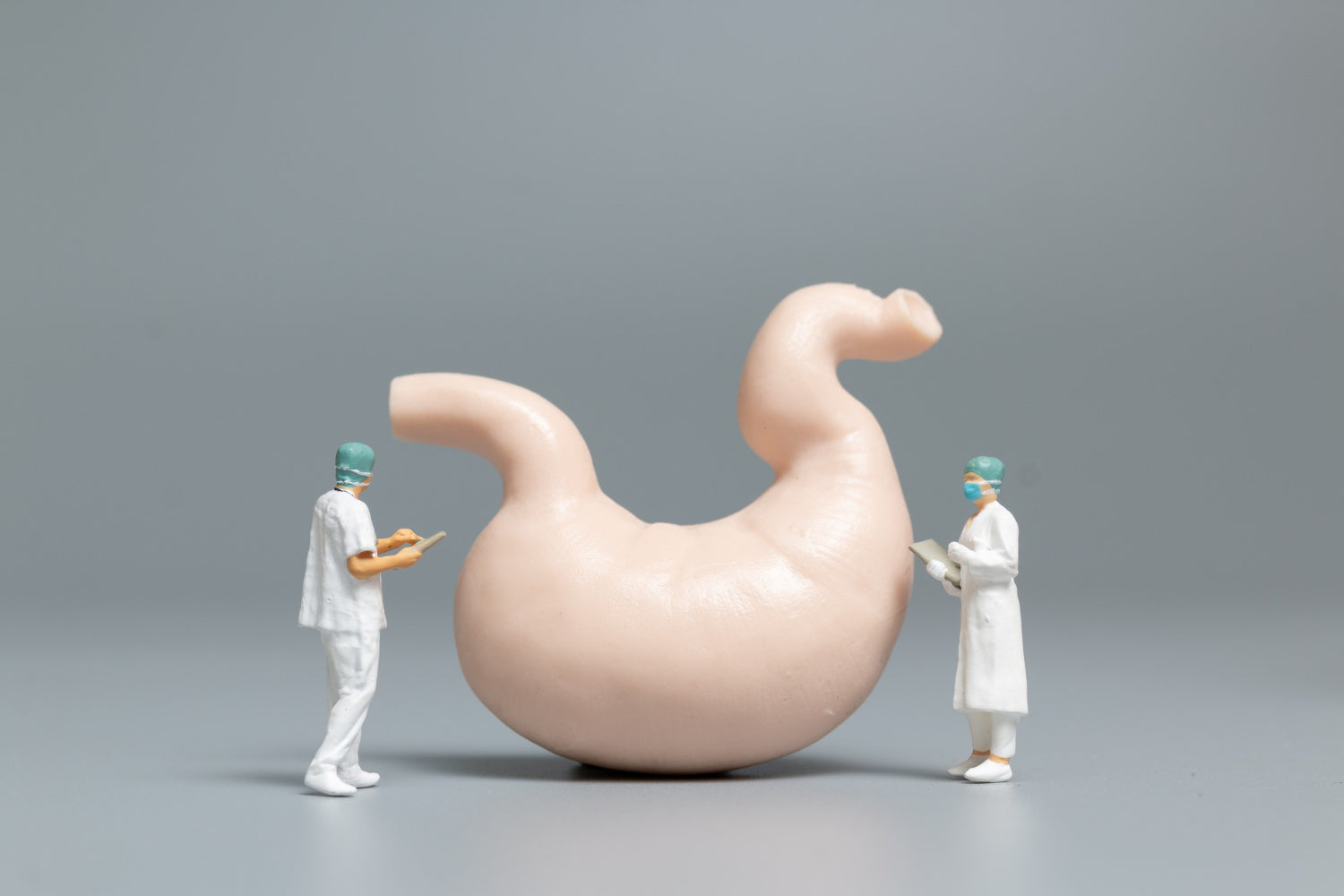Ever felt like your brain went on vacation after a cheat day? Or experienced butterflies in your stomach before a big presentation? Turns out, these connections are the result of the gut-brain axis.
This specialized communication network influences everything from your digestion, moods, and cognition to your immunity, long-term health, and more. Your goal? To optimize this superhighway for holistic wellness.
So, we’re trekking through the science to explore how the gut-brain axis works and share the best tips to improve its function. Trust us, you don’t want to leave this group chat on read.
What Is The Gut-Brain Axis?
The gut-brain axis is the collective term for all the bidirectional communication channels (two-way convos) between your brain and intestinal tract.[*] Its primary job is maintaining homeostasis, ensuring everything in your body runs smoothly.[*]
To do that, lots of key players send messages back and forth in the gut-brain axis (GBA) group chat, including:
The Central Nervous System (CNS)
The central nervous system includes your brain and spinal cord. It’s your body’s control center, processing information and directing all its functions.[*] The CNS sends and receives messages from:
The Enteric Nervous System (ENS)
The ENS is a complex network of nerves lining your digestive system.[*] It's often called the “second brain” because it has more neurons (brain cells) than your spinal cord. Your ENS chats with your CNS and gut bacteria via:
The Vagus Nerve
The vagus nerve is the longest nerve in your body — and the fastest, most direct route between your gut and brain.[*][*] Vagal pathways carry intel about your digestion, gut health, mental state, and more.[*][*]
The Neuroendocrine System
The neuroendocrine system bridges the gap between your nervous and endocrine systems.[*] The hypothalamic-pituitary-adrenal (HPA) axis is a perfect example of how this system works.
The hypothalamus (part of your brain/nervous system) sends signals to the pituitary gland, which controls your adrenal glands (part of your endocrine system). Your adrenal glands release the hormone cortisol as a stress response.[*]
Your HPA is heavily influenced by:
Your Gut Microbiome
Your gut microbiome contains around 100 trillion microbes, weighing an estimated total of one kilogram (2.2 pounds).[*] Microbes living in bacterial harmony with your body are called commensal bacteria. They play an important role in digestion, gut-brain communication, immunity, neurotransmitter production, and regulation of the HPA.[*]
There’s also evidence that your gut microbiome influenced your early life brain development and continues to affect neurogenesis (the growth of new brain cells) in your adult years.[*]
So now that we know everyone in the chat, let’s dive into:
The Benefits of a Healthy Gut-Brain Axis
Thanks to the GBA, your brain influences your gut activities, and your gut activities impact your brain functions.[*] This group chat unites the fields of microbiology, neuroscience, psychiatry, pathophysiology (the study of health and disease), and more.
So we have a plethora of research to explain why we should take care of this vital connection, such as:
1. Better Digestive Health
Digestion runs smoothly when your gut and brain are on the same page. Food moves efficiently through your gastrointestinal tract, enzyme secretion goes according to plan, and you experience less bloating and constipation.
You also score a lower risk of gastrointestinal disorders, such as irritable bowel syndrome (IBS) and inflammatory bowel disease (IBD). Plus, healthy gut bacteria form tight junctions throughout your GI tract to prevent intestinal permeability (aka “leaky gut”).
However, dysbiosis (an imbalance of gut bacteria) throws a wrench into this well-oiled machine.
Your immune system releases cytokines (tiny protein messengers) to fight off the horde of bacterial germs. This creates inflammation, leading to gut pain, hypersensitivity to certain foods, and intestinal motility dysfunction (how your intestines absorb nutrients and push waste along for elimination).[*]
Worse? This immune response can damage your mucosal lining, opening tiny holes that gastroenterology experts call “leaky gut.”
2. Leaky Gut Prevention
Our guts are naturally “leaky” to allow nutrient absorption. But extreme leakiness may allow bacteria and toxins to enter the bloodstream and reach every organ in your body.
This chronic systemic inflammation is commonly seen in IBS, IBD, obesity, type 2 diabetes, asthma, and rheumatoid arthritis.[*][*] More bad news: this modulation of the intestinal barrier also impacts the blood-brain barrier and, eventually, your brain.[*][*]
That’s why neuroinflammation and intestinal permeability are now recognized as connected features of neurodegenerative conditions such as mild cognitive impairment, Alzheimer’s disease, Parkinson’s disease, autism spectrum disorders, and more.[*][*][*]
3. Improved Mental Health
Your microbiota composition has such a massive influence over your brain function that many researchers say it’s better to refer to the GBA as the microbiota-gut-brain axis.[*] Here’s why:
Your gut produces and synthesizes several major neurotransmitters, including dopamine, GABA, and acetylcholine.[*][*][*] It also provides approximately 95% of your total serotonin.[*] These neurotransmitters are connected to mood, behavior, learning, motivation, sleep, relaxation, and cognitive function.
But when you’re stressed, the HPA axis releases cortisol, which negatively impacts your intestinal microbiota. These gut microbe alterations increase stress reactivity and anxiety. You may experience increased junk food and sugar cravings.[*][*] Or your CNS may send signals to slow digestion, leading to an upset stomach or a sudden urge to use the restroom.
Several psychiatric and mood disorders — such as chronic stress, anxiety, depression, bipolar disorder, and schizophrenia — have well-established links to GI dysfunction.[*][*] Up to 70% of depressed and anxious people report GI problems; 84% of IBS patients have a depressive disorder, and 44% have an anxiety disorder.[*]
Interestingly, multiple studies show that depressed people lack gut flora with microbial diversity, which leads to:[*][*][*]
- An overgrowth of gut microbes that promote inflammation
- Less effective conversion of tryptophan from food into the neurotransmitter serotonin
- Interference with various neurotransmitter receptors
- Higher gut permeability, which ignites inflammation in the brain
- Chronic activation of the HPA axis, rendering people over-reactive to stress
Now for some good news! A healthy gut can lead to a happier you. Research reveals that interventions targeting gut health have been shown to raise neurotransmitter levels and improve mental health.[*]
3 Science-Backed Hacks for a Healthy Gut-Brain Axis
Follow these easy tips to nurture and optimize your GBA for better physical and mental health:
1. Invite More Probiotics to the Party
Your GI tract harbors the densest concentration of immune cells in the body.[*] Since we can’t live in a germ-free world, we must ensure our gut microbiome is equipped to fight harmful pathogens.
Probiotics are live bacteria that boost good gut flora levels. You’ll find them in fermented foods such as yogurt, kefir, kimchi, kombucha, and sauerkraut.
Recent studies show that supplementation with probiotics, such as Bifidobacteria and Lactobacillus, may:[*][*][*]
- Strengthen gut barrier integrity
- Slash stress and fatigue by 40% after six months
- Boost moods, anxiety, and depression scores
- Heighten memory, learning, problem-solving, and information-processing
2. Feed Friendly Gut Bacteria with Prebiotics
Probiotics are good bacteria; prebiotics act like fertilizer to feed those friendly microorganisms and encourage them to flourish.
Scientifically, prebiotics are a type of dietary fiber that doesn’t get digested until it reaches the end of the line in your colon. Once there, it’s fermented by bacteria that produce beneficial short-chain fatty acids (SCFAs).[*][*][*]
These anti-inflammatory microbial metabolites nourish your gut lining and keep inflammation at bay. They also regulate the release of gut peptides that amplify serotonin synthesis.[*] SCFAs like butyrate can even cross the blood-brain barrier, acting as neuro-active brain health compounds to enhance mental clarity and shield your noggin from toxins.[*][*][*]
Low prebiotic intakes correlate with inflammatory diseases, obesity, type 2 diabetes, heart disease, anxiety, and stress.[*][*] However, researchers say the benefits of prebiotic fiber include:
- Improved moods, anxiety, stress, depression, and sleep [*][*]
- Better metabolic health and weight loss [*][*]
- Lower risks of cancer, obesity, type 2 diabetes, and heart disease [*][*]
- Higher brain-derived neurotrophic factor (BDNF), which is essential for learning and memory and promotes neuroplasticity (mental flexibility) by stimulating the growth of new neurons [*][*]
Prebiotics naturally exist in almonds, asparagus, garlic, chicory, onion, Jerusalem artichokes, peas, chia seeds, flax seeds, seaweed, and many other plants.[*][*]
3. Try IQBAR!
IQBARs are a champion for your gut-brain connection because they’re:
🌱 A complete vegan protein source. Eating more plant-based foods supports gut microbiome diversity and the growth of good bacteria.[*] Our short list of minimally processed whole foods makes every IQBAR a non-GMO, gluten-free, dairy-free, and soy-free win.
💪 Packed with prebiotic fiber. IQBARs contain 6-9 grams of tapioca fiber, so you can score all those perks we shared before, reduce hunger, and increase feelings of fullness with every tasty bite.[*]
✅ Sugar-free. Sugar encourages the growth of harmful gut bacteria, strips your protective gut lining, spurs inflammation, and makes it difficult for your microbiome to help regulate blood sugar levels.[*] Sugar alcohols also wreak havoc on your gut microbiome.[*] That’s why we prefer stevia!
🧠 Deliver brain-supporting nutrients. IQBAR’s key ingredients help supercharge your focus, conquer stress and anxiety, and keep your cognitive edge razor-sharp — well into your golden years.
Happy Gut + Healthy Mind = Your Best Life
It may seem like the gut-brain axis group chat is taking place without you. But you’re the moderator of this powerful convo! Nurturing your GBA with probiotics, prebiotics, and more sugar-free, plant-based foods can unlock the ultimate synergy: a happy, healthy gut working in harmony with a cognitively fit mind.
🙌 Invest in your gut, and watch your whole well-being thrive! Grab the IQBAR 7 Bar Sampler to try every flavor and discover the perfect fit for your microbiome (and taste buds) now!
Written by Lauren Ciccarelli, a writer and research geek passionate about low-carb nutrition, mental health, and meditation. Her 2,500+ articles empower doers with science-backed tips for leveled-up living.



